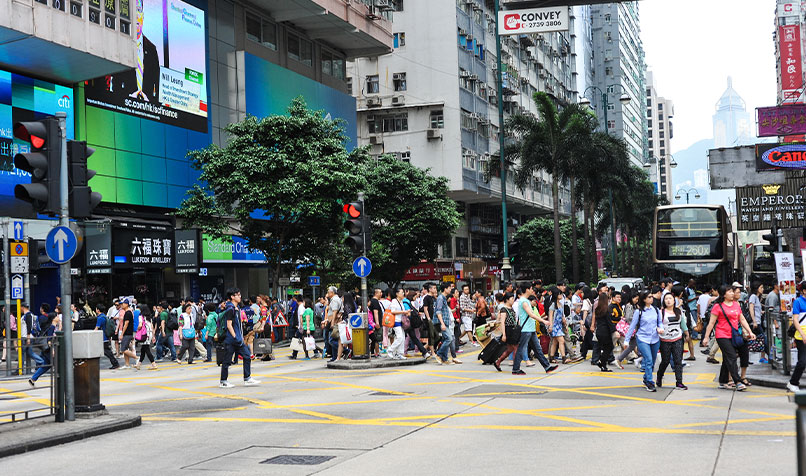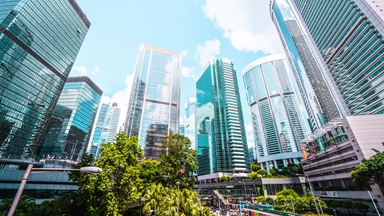Loading component...
At a glance
Hong Kong Financial Secretary Paul Chan has unveiled a raft of initiatives in the 2023-2024 budget to maintain public confidence in wake of the COVID-19 pandemic and reaffirm the Hong Kong Special Administrative Region’s status as a leading international financial centre.
In his opening remarks, Chan said the theme this year is: “Leaping forward steadily, together we bolster prosperity under our new vision.”
“Overall, we will take a ‘moderately liberal’ fiscal stance,” he said.
Chan declared that more than 80 per cent of the budget’s initiatives will benefit the public and, notably, small-to-medium enterprises (SMEs).
Return to growth
Despite weakening economic growth in the US and Europe, Hong Kong’s economy is still expected to grow by 3.5 to 5.5 per cent in 2023 – in part because of its reopening with the Mainland. This contrasts sharply with the 3.5 per cent contraction experienced in 2022.
However, property prices have dropped 15.6 per cent, with sales down 40 per cent.
On the upside, unemployment is gradually declining. Chan predicted that from 2024 to 2027 the Hong Kong economy will grow by an average of 3.7 per cent per annum. This would be higher than the decade before the pandemic. Underlying inflation is forecast to average 2.5 per cent per annum.
Consumption vouchers to continue

Hong Kong residents will receive another round of consumption vouchers in this year’s budget, but the amount will be less.
“I will issue electronic consumption vouchers again this year with a total value of HK$5000 to each eligible Hong Kong permanent resident and new arrival aged 18 or above in two instalments,” Chan said.
The government will first disburse consumption vouchers valued at HK$3000 in April this year using the registration data of last year’s scheme.
The remaining vouchers will be disbursed together with the vouchers for new eligible persons in the middle of the year. CPA Australia project the overall cost of the voucher scheme to be about HK$33 billion.
According to CPA Australia’s senior manager business policy, Gavan Ord, these vouchers are designed to stimulate domestic spending and boost the economic recovery.
Ord notes that the financial secretary concluded that the importance of sustaining the recovery outweighed the inflationary risk of the payment and the impact it has on public finances.
SMEs emerge as the big winners
To further ease the operating pressures on businesses, Chan announced that the government will reduce profits tax for the 2022-2023 year of assessment by 100 per cent, subject to a ceiling of HK$6000.
This is expected to benefit 134,000 businesses but reduce government revenue by HK$720 million.
Further, the government will provide a rates concession for non-domestic properties for the first two quarters of 2023 and 2024. This will be subject to a ceiling of HK$1000 per quarter for each rateable property.
This is likely to involve 430,000 non-domestic properties but, again, it will negatively impact government revenue by around HK$740 million.
Also, starting from July this year, the government will grant a 50 per cent rental or fee concession to eligible tenants of government premises and eligible short-term tenancies and waivers under the Lands Department for six months until the end of 2023.
It’s great news for small business tenants of government premises but will reduce government revenue by approximately HK$1 billion.
“The government has been enhancing the SME Financing Guarantee Scheme (SFGS) continuously over the years to meet the financing needs of SMEs during economic downturns,” Chan noted.
At the end of 2022, loans amounting to more than HK$230 billion have been approved under the SFGS, benefiting over 53 000 enterprises.
“As the Hong Kong economy is picking up steadily this year, it is expected that commercial financing will gradually return to be adjusted by the market,” Chan continued.
“That said, it takes time for SMEs to consolidate their strengths on the way to recovery. I have, therefore, decided to extend the application period of all guarantee products under the SFGS from end‑June 2023 to end‑March 2024, thus giving SMEs more room to adjust and secure a firm footing.”
Something for everyone
With many Hong Kongers having endured hardships during the pandemic, a new allowance to eligible social security recipients will be available. The allowance will be equal to one-half of a month of standard rate comprehensive social security assistance payments, old age allowance, old age living allowance, or disability allowance. It will be accompanied by a six-month extension to the temporary special measures under the Public Transport Fare Subsidy Scheme.
At a cost of about HK$$2.9 billion, each eligible residential electricity account will be granted a subsidy of HK$1000. The current arrangement of distributing electricity charges relief of HK$50 a month to each eligible residential electricity account will be extended to the end of 2025. This will benefit around 2.9 million residential households.
Filling the talent gap
The government has proposed an array of initiatives to “trawl for outside talents alongside the government's efforts to nurture local talents, with a view to contributing to our economic development”.
The Labour and Welfare Bureau is currently updating a “talent list” to better reflect the labour needs of employers.
Consistent with a recommendation in CPA Australia’s Pre-Budget submission, a new Capital Investment Entrant Scheme will be introduced.
Applicants will be required to invest a certain amount in the local asset market, excluding property. If approved, they will be able to reside and pursue development in Hong Kong.
Even as the Hong Kong Government strives to put the difficulties of the past few years behind it, there is still a long road ahead to achieve full economic recovery.
The potential infusion of new talent will certainly help but even in combination with the budget initiatives Chan announced, more will probably still be required.
Other support measures

With the 2022-2023 consolidated deficit forecast to be HK$139.8 billion and fiscal reserves forecast at HK$817.3 billion by the end of March 2023 – the Hong Kong Special Administrative Region also has other economic support measures up its sleeve.
These include:
- Offering shopping and dining privileges to one million inbound visitors and enlivening the city’s image with HK$50 million to be spent on the promotion and branding of Hong Kong.
- Earmarking HK$500 million to launch a Digital Transformation Support Pilot Program to help SMEs apply ready-to-use basic digital solutions.
- Investing HK$50 million to expedite the development of the Web3 ecosystem.
- HK$6 billion for universities and research institutes to establish thematic research centres related to life and health technology.
- A plan to issue no less than HK$50 billion of Silver Bonds and $15 billion of retail green bonds in the next financial year.
- Review the development potential and prospects of tokenised bond issuance.
- Continue to explore with the Mainland an expansion of mutual market access and enhancement arrangements.
- Allocate HK$100 million to the Hong Kong Productivity Council to strengthen assistance for SMEs applying for government subsidies.
- Provide an additional HK$550 million to the Hong Kong Trade Development Council to assist enterprises opening in new markets.
- Expand the scope of the Government Green Bond Programme to cover sustainable finance projects and set up an Infrastructure Bond Scheme to better manage the cash flow needs of major infrastructure projects.
Reactions to Hong Kong Budget 2023-2024
Anthony Lau FCPA, Co-Chairperson of the Greater China Taxation Committee
“In terms of revitalising the economy and attracting business investment, we support the government’s decision to introduce a new Capital Investment Entrant Scheme to attract talent and capital investment.
“This scheme does not include property investment so as to avoid adding pressure to property prices.
"However, businesses still face pressures in the first half of the year and need a little extra support to recover, especially as many major economies face heightened risks of recession.
“The government should consider maintaining the 100 per cent profits tax rebate ceiling of HK$10,000 and continue waiving the business registration fee for the financial year 2023-2024 to help businesses recover.
“We welcome the introduction of a mechanism to facilitate companies domiciled overseas to re-domicile in Hong Kong. This will enhance Hong Kong’s competitiveness as a headquarter hub for multinational enterprises.
“To complement this re-domiciliation mechanism, we suggest the government also consider offering additional support to regional headquarters – for example, an 8.25 per cent preferential tax rate for MNE groups that will not be subject to the global minimum effective tax rate starting from 2025.
"Considering that the property market fell by around 15 per cent in 2022, we welcome the adjustment to the value bands of the ad valorem stamp duty for small and medium-sized apartments. This will help first-time homebuyers.
"Regarding the tax increases announced in the budget, our Hong Kong Tax Survey 2020 showed that if the government were to increase taxes, the most popular tax to increase was the duty on tobacco, alcohol, and hydrocarbon oil. The second most popular choice was for the introduction of an environmental protection tax.
“Considering that the last increase in tobacco duty was in 2014, we believe the government's proposal to increase tobacco duty is reasonable.
The new measure increases the tax as a percentage of one pack of cigarettes from about 62 per cent to about 68 to 70 per cent, which is close to the 75 per cent standard recommended by the World Health Organization.
Janssen Chan FCPA, Co-Chairperson of the Greater China Taxation Committee
“Hong Kongers will welcome the government’s decision to issue two further rounds of consumption vouchers, however, the overall relief measures for individuals are less than last year.
“Aside from increasing the child allowance, other relief measures such as support for underprivileged groups have not continued. Given that the public and SMEs still need time to recover, the government should consider increasing support for lower income households.
“In addition, the basic allowance of HK$132,000 has not increased since 2016-17. We believe that the government should consider increasing it to $150,000. At the same time, the government should consider maintaining the salaries tax rebate of HK$10,000.”
“We support the government's proposal to increase the tax deduction for the Mandatory Provident Fund voluntary contributions made by employers for employees aged 65 or above, from the current 100 per cent to 200 per cent.
“We also suggest the government consider introducing an additional tax deduction on salaries expenditure for companies hiring employees aged 60 or over. This could be limited to an annual cap per eligible employee – for example, HK$120,000.
"Regarding support for SMEs, its pleasing that Mr Chan announced an extension of the application period of the SFGS to March 2024.
“This is something we recommended in our Pre-Budget submission to the government. The introduction of the Digital Transformation Support Pilot Program should help more businesses digitalise and grow.
“To promote environmental, social, and governance [ESG] adoption among SMEs, the government should consider establishing a dedicated ESG funding program to assist them to adopt ESG into their business models.”

